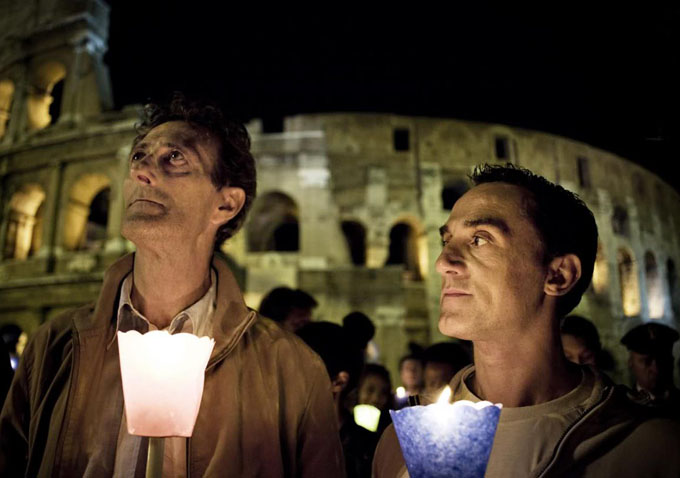 The relationship between audiences and reality television has shifted to some degree over the past decade (or longer). Where early shows were once positioned as voyeuristic/documentary style looks at Real People, it quickly became clear to those in front of the camera, behind it and at home watching, that reality television is just a different kind of performance. While these programs are ones ostensibly rooted in Real Life, the people selected for these shows — as well as the writers, producers and directors — have become increasingly aware of the audience, playing directly to them. Simply put, most people know reality television is actually not that real at all, but in case you forgot, Matteo Garrone‘s “Reality” is here to remind you.
The relationship between audiences and reality television has shifted to some degree over the past decade (or longer). Where early shows were once positioned as voyeuristic/documentary style looks at Real People, it quickly became clear to those in front of the camera, behind it and at home watching, that reality television is just a different kind of performance. While these programs are ones ostensibly rooted in Real Life, the people selected for these shows — as well as the writers, producers and directors — have become increasingly aware of the audience, playing directly to them. Simply put, most people know reality television is actually not that real at all, but in case you forgot, Matteo Garrone‘s “Reality” is here to remind you.

From the outset, Luciano (Aniello Arena) hardly seems like someone who would be interested or have time for “Big Brother.” Not only are his days tied up as a fishmonger in Naples, but to earn extra money, he’s running a bit of a shady side business in black market kitchen appliances. But he does know how to let his hair down…or in this case, put it on. He’s known as a bit of a performer, with a handful of characters, costumes and wigs that he brings out for entertainment at family functions, but nothing he would consider as a career, much less a path to riches. That is at least not until his young daughter, a fan of “Big Brother,” urges him audition for the show at a casting call in a mall near their home. He does so to humor his daughter, and it surprised when he’s called for a second round. And that’s essentially the story.
After taking on Italy’s criminal and political spheres with the excellent “Gomorrah,” reality television seems like a softball subject, and unfortunately, it is. The topic has already been dissected and discussed to death in countless feature films, documentaries, magazine article and more, and Garrone really has nothing more to add. But it’s not for lack of trying. In an economically struggling Italy, “Big Brother” is seen as an instant path to fame and glory, and somewhat inexplicably, Luciano grows obsessed with getting on the show. He thinks he’s nailed the second audition and is waiting for a phone call that believes is imminent, but as the days turn to weeks, he falls into a downward spiral when it becomes increasingly clear he has not been selected. Luciano becomes paranoid that the network have sent people to Naples to spy on him and see if his story checks out, and in a sense he begins “performing” as the man he thinks producers want him to be, before losing it completely.

But Garrone says nothing that we haven’t heard before about the increasingly popular medium. The director lingers over the the sign of the famed Italian studio Cinecitta as Luciano heads into his audition, as if to share his disbelief that such a fabled ground for some of the country’s greatest cinematic works, could dare play host to such “low art.” And we watch “Big Brother” along with Luciano, and yes, it’s pretty empty and vacuous. So? As the sluggish and lifeless film wears on, Garrone’s one note becomes monotonous, not only diminishing any dramatic heft it might have, but making Luciano’s fixation on being on the show — at the sake of his marriage, family and business — hard to believe.
It’s a disappointment that “Reality” is both idealogically and narratively lightweight, even though the technique and aesthetics behind it are top shelf. The film boasts a handful of gorgeous, long tracking shots (extra points to DoP Marco Onorato) as well as a beautiful score by Alexandre Desplat. And while it’s great to look at, “Reality” is an empty shell. A feature length examination on the artifice of reality programming, Garrone’s film itself is superficial and lacking the same depth of artistry and ideas he finds absent on TV. [C-]
This is a reprint of our review from the Cannes Film Festival.

